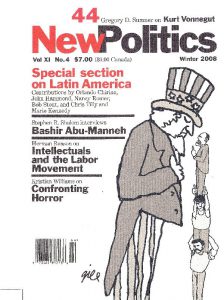
From the Editors, Marvin Mandell and Betty Reid Mandell
Letters
* M. Riben reply to Betty Reid Mandell
* D. Finkel reply to . . .
Whole Number: 44

From the Editors, Marvin Mandell and Betty Reid Mandell
Letters
* M. Riben reply to Betty Reid Mandell
* D. Finkel reply to . . .
THEY GRABBED ME, THEY HIT ME, they yanked me by the hair and threw me in the back of a pickup. They sprayed me with tear gas and held a knife to my back. They said they were going to rape me and throw me in the ocean. They said other police were raping my novia (girlfriend) right then.
ON MARCH 24, 2007, Venezuela’s President Hugo Chavez announced to a gathering of about 3,000 supporters that he was creating a Unified Socialist Party of Venezuela (PSUV). The following interview was conducted (by the Venezuelean group aporrea) on April 13, 2007, with Orlando Chirino, national organizer of the UNT (Union Nacional de Trabajadores—National Union of Workers). Chirino is the leader of C- Cura–the United Autonomous Revolutionary Class Current—within the PSUV.
EMIR SADER EMBODIES, to the extent any one person can, the trajectory of Latin America’s left movements. A Marxist sociologist with a long track record of studying Latin American politics, currently Executive Secretary of the Latin American Council of Social Sciences (CLACSO), Sader is Brazilian by birth but fled Brazil at the end of the 1960s as the dictatorship tightened its grip. In Chile, he then participated in the electoral path to socialism preached by Salvador Allende’s Popular Unity government, until the 1973 coup forced him to flee again.
LEFTISTS WON PRESIDENTIAL ELECTIONS IN 2006 across Latin America: starting (at the end of 2005) with the stunning victory of Evo Morales in Bolivia, through the election of Socialist Michele Bachelet in Chile, the predictable reelection of Lula in Brazil and Hugo Chàvez in Venezuela (though Lula, winning less than 50 percent of the vote in the first round, was forced into a runoff), and the runoff victory of Rafael Correa in Ecuador.
IMMIGRATION HAS BECOME THE MOST DIVISIVE ISSUE in domestic American politics since civil rights. Not for the first time in American history, immigrants have become scapegoats for many of the real problems of America's middle and working classes.
WHEN THE REVOLUTION COMES it will be led by women in aprons, women with their rubber-gloved hands on their hips. Or so the cover of Dorothy Sue Cobble's new anthology, The Sex of Class: Women Transforming American Labor might suggest. The anthology includes a wide array of primarily women's voices, ranging from university professors to labor activists, all engaged in debate and discussion about the changing face of the labor movement.
VILLA VICTORIA—a great title. As with other legendary ethnographies—Street Corner Society, Urban Villagers, Tally's Corner, All Our Kin, and Sidewalk, Villa Victoria projects images of Gemeinschaft, of that quintessential social bond that survives even in the city that notoriously eviscerates the social bond. Although the contents of these books often contradict expectations, the romantic impulse excited by the titles is not so easily rebuffed by cold facts.
Our political organization is thoroughly rotten, almost non-existent. It is Carthagian… Never was there such an absurd waste of power, such ridiculous inconsequence of policy—not for want of men but for want of any effective central authority or dominant idea to make them work together.
André Siegfried, England's Crisis, 1931
I DID NOT DREAM OF BEING TORTURED.
But I did dream of being caged, of being bound and blindfolded, of being kept cold and naked in a small steel box. I dreamed of terrible footsteps, always approaching, and the chilling sound of metal clanging against metal. I dreamed of endless screams, and of shadows that stretched toward me, and of hands holding instruments that I could never quite see.
The dreams ended, always, before the pain could become real. But that is a small matter. The fear was real enough.
New Politics: 2008 is the sixtieth anniversary of the founding of Israel and of the Nakba, the Palestinian catastrophe. What do you see as the Israeli goal and has it changed over the years?
AS FAR AS CAN BE DISCERNED from Sherry Gorelick's review of Mario Kessler's On Anti-Semitism and Socialism (New Politics, No. 43, Summer 2007), neither Professor Gorelick nor Kessler appear to be aware of two essential sources on the subject, which I would like to bring to readers' attention.
A NEW ALLIANCE OF DEMOCRATICALLY-ELECTED GOVERNMENTS with a range of socialist programs is sweeping Latin America. New trade agreements that embrace the possibility of pan-regional alliances are being forged. Venezuela, Ecuador, and to a significant extent Argentina, Chile, Nicaragua, and Brazil articulate some policies of uplifting the poor and challenging US and neoliberal hegemony. Other nations are making their way to this list. Among these synergistic movements, no country in Latin America is better positioned to become a democratic socialist state than Bolivia.